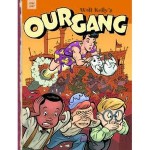
By Walt Kelly (Fantagraphics Books)
ISBN: 978-1-60699-322-4
The Our Gang (later to be known as the Li’l Rascals) movie shorts were one of the most popular series in American Film history. Beginning in 1922 they featured the fun and folksy humour of a bunch of “typical kids†(atypically though, there was full racial equality and mingling – but the little girls were still always smarter than the boys) having idealised adventures in a time both safer and more simple. The rotating cast of characters and slapstick shenanigans were the brainchild of film genius Hal Roach (he directed and worked with Harold Lloyd, Charley Chase and Laurel and Hardy amongst many others) and these brief cinematic paeans to a mythic childhood entered the “household name†category of popular Americana in amazingly swift order.
As times and tastes changed Roach was forced to sell up to the celluloid butcher’s shop of MGM in 1938, and the features suffered the same interference and loss of control that marred the later careers of the Marx Brothers, Laurel and Hardy and Buster Keaton.
In 1942 Dell released an Our Gang comic-book written and drawn by Walt Kelly who, consummate craftsman that he was, restored the wit, verve and charm of the cinematic glory days with a progression of short tales that elevated the lower-class American childhood to the mythic peaks of Dorothy in Oz or Huckleberry Finn.
Over the course of the first eight issues (see Walt Kelly’s Our Gang volume 1) the master raconteur moved beyond the films – good and otherwise – to build an idyllic story-scape of games and dares, excursions, adventures, get-rich-quick-schemes, battles with rival gangs and especially plucky victories over adults: mean, condescending, criminal or psychotic. Given more leeway, Kelly eventually in-filled with his own characters, but for this book aficionados and purists can still thrill to the classic cast.
This long-awaited fourth collection gathers the adventures from issues #24 to #30 (July 1946l -January 1947), and finds Kelly inserting more of himself into the mix. Here the light-hearted yarns often evolved into full-blooded dramas, with murderous returning villains and bold excursions far beyond what modern parents would allow their cosseted darlings to experience, all based on Kelly’s great fondness for the wholesome adventures of daring youth written by Horatio Alger and Oliver (the Rover Boys, Bobbsey Twins, Tom Swift) Optic.
The entrancing full colour fun leads off with riotous rumbles as Buckeye and Red Macdougal build a fake teleportation machine to prank Froggy, only to have two burglars steal the cardboard contraption thinking it the real deal, and thereafter the entire gang gets into serious danger when The Barrel returns.
The Hispanic master-criminal wants revenge for the way the kids foiled his counterfeiting ring, but luckily the old circus entertainer Professor Gravy is around – with his lion and tiger…
A rare (for the era) continued storyline begins with #26 as Froggy, Macdougal and Julip the goat join the Professor on his showboat for a summer of entertaining the river towns. Unfortunately the fugitive Barrel is also on board, incognito and desperate to skip town…
By the next issue the kids have taken care of their arch-enemy (for the meantime) and Julip takes centre-stage – or deck – when he swallows a talking toy parrot and the Professor thinks he’s found the showbiz sensation of the century: a hilarious tale that introduces as memorable new cast member, blustery lady-wrestler Guinevere.
As the kids continue their parent-free working vacation the showboat takes on two new passengers; a thoroughbred race horse and his owner trying to avoid thieves keen on stealing the elite hayburner. If I just mention that this is the same week that the boys are trying to perfect their pantomime-horse act I suspect you can guess where this tale is heading…
The two-fisted dénouement of that escapade left the riverboat high and dry on a reef, and in #29 the stranded cast decides that they will trap the horse-thieves who escaped capture during the battle that led to the crash. This is a dark tale indeed as Macdougal is kidnapped and shot, but the bonny lucky lad soon turns the tables on the villains thanks to some ghastly green flares and a handy graveyard…
This volume ends as the boys return to school and plunge straight into Baseball woes as old rival Feeny of the Gashouse gang frames the bespectacled Froggy. Banned by his teacher from playing in a vital match, the little wise guy needs somebody to pretend to be his mother and get him out of an unjust punishment. It’s a measure of his tenacity if not faith, when three separate versions of his mom turn up at the game…
Today’s comics have nothing like these magical masterpieces to offer to contemporary audiences. Many readers might not even be able to appreciate the sheer beauty, narrative charm and lost innocence of this style of children’s story: sumptuous confections from a true legend of our art-form with truly universal appeal.
If so I genuinely pity them, because this is work with heart and soul, drawn by one of the greatest exponents of graphic narrative America has ever produced. Be assured however, that their loss need not be yours…
© 2010 Fantagraphics Books. All Rights Reserved.
